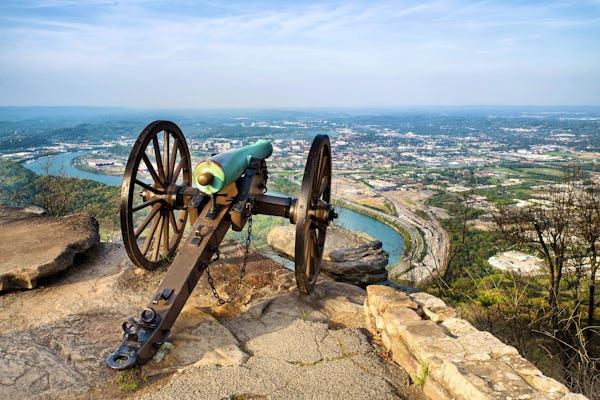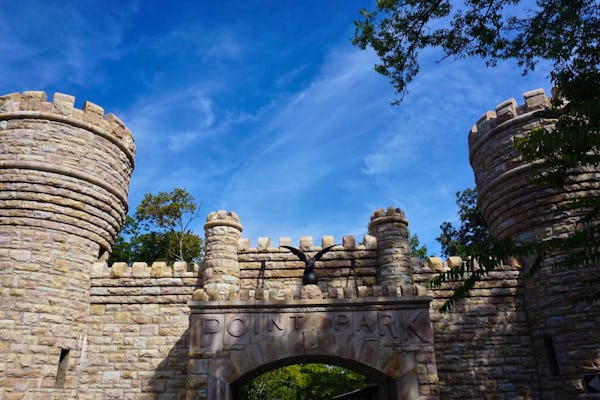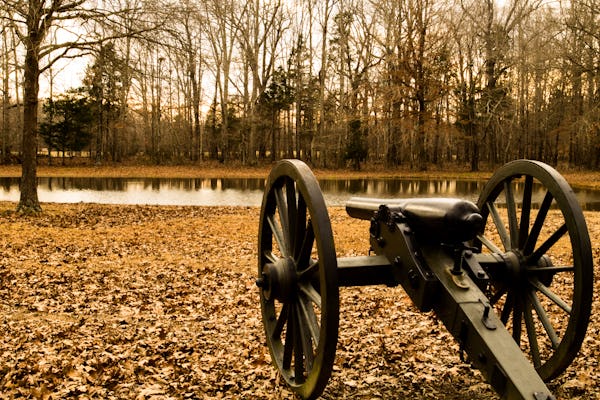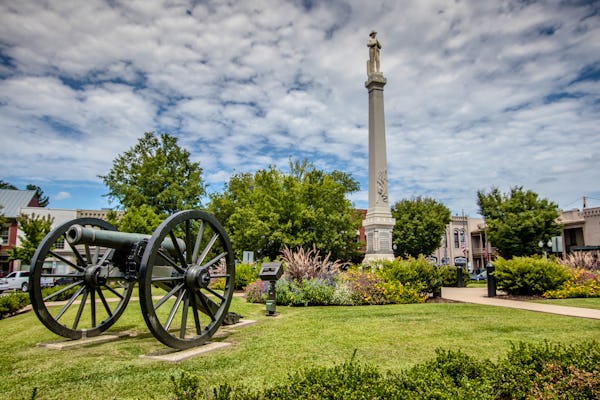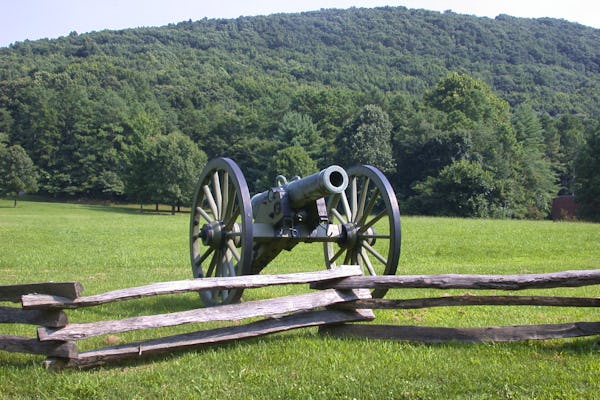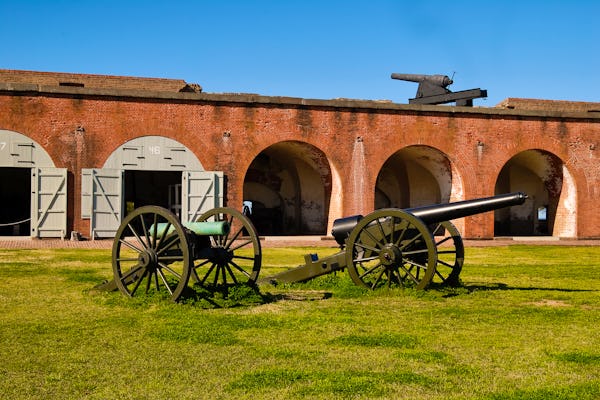Find your next holiday
Filter Holidays
Last-Minute Holidays
Look forward to a holiday departing soon!
Ready for a sensational summer?
If you’re dreaming of those summer days, secure your perfect holiday while places last!
American Civil War – The Blue & The Gray
One of the defining historical moments of the USA's history, the American Civil War is the costliest and deadliest war ever fought on American soil. On this tour, we discover key battlefield sites throughout the southern states, as well as visiting some of the most important museums related to the subject on this brand new battlefield tour.
Tour Includes
- 11 nights hotel
- Return flights to Atlanta with one checked-in suitcase, Airport transfers & Hotel porterage for 1 bag per person (Air tour only)
- Fully escorted in the USA by a Specialist Historical Guide
- Air-conditioned coach travel
13 days from £4,749pp
Travel Options
Outbound &
Inbound Travel
Outbound
Travel
Inbound
Travel
On-Tour
Experiences
Steps to booking your Holiday
-
Tour Details Find a day-by-day breakdown
of the tour -
Select your Departure Browse the available
departure dates -
Checkout Follow our secure checkout
process to book your place
Itinerary
Please choose your preferred 13 day itinerary
Fly to Atlanta where you will be greeted by your guide and transferred to your hotel for an overnight stay.
Follow in the footsteps of General William T. Sherman’s Union Army 1864 to 1865 march through the Confederacy with our first stop at the Battlefields of Chickamauga and Chattanooga.
It is here on September 20, 1863, at Chickamauga and later, on November 23, 1863, at Chattanooga, that 'the death-knell of the Confederacy' was rung, setting the scene for Sherman’s march to the Sea. Both sides fought desperately for control of Chattanooga as it was known as the 'Gateway to the Deep South'.
The Confederates were victorious at Chickamauga, however, renewed fighting in Chattanooga provided Union troops victory and final control of the city.Today, we meet our local expert guide and relive this epic struggle between Union Major General William Rosecrans and Confederate General Braxton Bragg at Chickamauga, which resulted in more than 34,000 casualties, one of the bloodiest battles of the Civil War. We stay in Chattanooga for two nights.
Union forces routed Confederate troops in Tennessee at the battles of Lookout Mountain and Missionary Ridge, known collectively as the Battles for Chattanooga.
Join our local expert guide and immerse yourself in the historic battle that took place on Lookout Mountain, called the 'Battle Above the Clouds'. Ride up the mountain on the Incline Railway and take the short walk to Point Park, where Union soldiers surprised Confederates by sneaking up the mountain during an unusually thick fog.
We then check out the Battles for Chattanooga Museum, a newly renovated visitor centre, for a 3-dimensional presentation of the battle. We then pay our respects at The National Cemetery, which Major General. George H. Thomas, 'The Rock of Chickamauga', issued General Orders No. 296 to create a national cemetery in commemoration of the Battles.
Today we bid farewell to Chattanooga and cross over the state line into Mississippi and the town of Corinth. For six months in 1862, Corinth became a critical railroad junction and second only to Richmond in military importance, and hence the battle of Corinth captured the full attention of a divided nation.
One of the National Park Service’s newest visitors’ centres interprets the key role of Corinth in the Western Theatre of the American Civil War.Next, we visit the Crossroads Museum at The Historic Depot to further understand the crucial role, that a strategic transportation hub played in the Civil War.
We stay overnight in Corinth.Key Visits
Returning to Tennessee, we explore the Battlefield of Shiloh this morning. Located on 4,000 acres overlooking the Tennessee River, 151 monuments, 217 cannons and over 450 historic tablets mark America’s best-preserved battlefield and the site of the Civil War’s first major combat in the Western Theatre.
Fought April 6 - 7, 1862, the Battle of Shiloh (also known as Pittsburg Landing) gave Federal General U.S. Grant his sternest test and witnessed the death of Confederate General Albert Sidney Johnston, the highest-ranking American ever killed in combat.
We then continue towards Nashville where we stay overnight south of the city in preparation for our next historic visit, The Battle of Franklin.
Franklin, Tennessee witnessed five of the bloodiest hours in all American history on November 30, 1864.
Join our guided walking tour as we hear how Lieutenant General John Bell Hood, frustrated that his Confederate Army of Tennessee had let a large Union force escape from Columbia the night before, ordered an all-out frontal assault against the Union fieldworks at Franklin.
The Southerners advanced across an open field, enfiladed in places by artillery from Fort Granger across the Harpeth River. Many of their Union opponents were armed with repeaters, yet they nearly broke through near the centre of the Union line, only to be repulsed at a cost of 6,200 casualties.
Following the tour, we continue onto Atlanta, Georgia where we stay for three nights.
Today we visit the battlefields close to Atlanta.
First, we see Pickett’s Mill Battlefield, where on 27 May 1864, the new commander of the Union Army, General William Sherman’s advance was halted. Almost 25,000 men fought the terrain, the heat, the fear and each other in an area that became forever known as ‘the hell hole’.
We will tour the major Confederate defensive works on Kennesaw Mountain. Ordered by Grant to bring the Confederate Army to battle, Sherman sent his troops against strong opposition at Cheatham Hill.
Repulsed, bloody, with losses of 4 to 1, and under threat of removal from command, he flanked Johnston’s position and continued his drive to Atlanta.
We take a break from battlefields today to visit the recently restored and relocated 'Battle of Atlanta Cyclorama' at the famous Atlanta History Centre.
This immense circular painting depicts The Battle of Atlanta that occurred on July 22, 1864, and the building contains many Civil War artefacts as well as “The Texas” locomotive.
This afternoon we travel to Stone Mountain with its huge carvings of southern heroes Jefferson Davis, Robert E. Lee, and Stonewall Jackson and take the cable car to the top of the monolith where magnificent views of hundreds of miles of Georgia countryside await.A Civil War trip to the South is not complete without mention of the film 'Gone with the Wind' so this morning we visit the Road to Tara Museum in Jonesboro GA.
Whether you're a Gone with the Wind fan or history buff, the Road to Tara Museum boasts items from the famous movie and book along with artefacts from the Civil War.
See the progression from the real history of the Civil War's Atlanta Campaign and the 1864 Battle of Jonesboro to Margaret Mitchell's and Hollywood's interpretation through Gone with the Wind.
We continue towards Savannah but not before a detour to the infamous Andersonville Prisoner of War Camp.
Although only in operation for fourteen months, out of the 45,000 Union soldiers imprisoned there, nearly 13,000 died from disease, poor sanitation, malnutrition, overcrowding or exposure. We continue to Savannah, where we will stay for two nights.Key Visits
"...I beg to present to you as a Christmas Gift, the City of Savannah with 150 heavy guns and plenty of ammunition and also about 25,000 bails of cotton..." so read Union General William T. Sherman's telegram to President Lincoln written on December 22, 1864.
Join your local guide for a walking and coach tour of the city as we explore the events of the Federal Occupation.In the afternoon we visit Fort Pulaski where, in 1862, the Union army asked Colonel Charles Olmstead, commander of the Confederate garrison, to surrender, but he refused.
And so began the siege of Fort Pulaski, where Union troops used state-of-the-art guns, among them the new James Rifled Cannon and the Parrott Rifle, in a 30-hour bombardment of the fort until it was penetrated, and the Confederate commander surrendered.
The siege became a historic experiment of military science and invention, and a case against military masonry construction.
Today we cross into South Carolina and the city of Charleston where the Civil War erupted on April 12, 1861, when Confederate artillery opened fire on Fort Sumter, the Federal fort located in Charleston Harbor.
Our first stop, however, is the Warren Lasch Conservation Center for one of the most unique visitor experiences available in Charleston – The Hunley. On February 17th, 1864, the H. L. Hunley became the first successful combat submarine in world history with the sinking of the USS Housatonic.
After completing her mission, she mysteriously vanished, only to be rediscovered in 1995 and raised in 2000. Immerse yourself in the history of this remarkable vessel and her crew and discover the fascinating discoveries resulting from forensic science, archaeology, and conservation.
This afternoon we take the ferry out to Fort Sumter, the focal point in time marking the start of hostilities between Union North and Confederate South.We stay overnight in Charleston.
Key Visits
Today we travel towards Atlanta for our flight home via Ehrhardt SC. Rivers Bridge State Historic Site Battlefield marks the site of one of the Confederacy’s last stands against General William T. Sherman’s sweep across the South. Of all the Civil War Sites in South Carolina, the Battle of Rivers Bridge is the only one in the State Parks system that is home to a preserved battlefield.
Our Ranger-guided tour will walk us the 3/4 -mile trail of one of the most well-preserved Civil War sites in South Carolina, which includes still-intact earthen fortifications.We then transfer to Atlanta airport for your return flight.
Key Visits
Arrive back in the UK.
Make your own way to our hotel in Atlanta where you will join the tour.
Follow in the footsteps of General William T. Sherman’s Union Army 1864 to 1865 march through the Confederacy with our first stop at the Battlefields of Chickamauga and Chattanooga.
It is here on September 20, 1863, at Chickamauga and later, on November 23, 1863, at Chattanooga, that 'the death-knell of the Confederacy' was rung, setting the scene for Sherman’s march to the Sea. Both sides fought desperately for control of Chattanooga as it was known as the 'Gateway to the Deep South'.
The Confederates were victorious at Chickamauga, however, renewed fighting in Chattanooga provided Union troops victory and final control of the city.Today, we meet our local expert guide and relive this epic struggle between Union Major General William Rosecrans and Confederate General Braxton Bragg at Chickamauga, which resulted in more than 34,000 casualties, one of the bloodiest battles of the Civil War. We stay in Chattanooga for two nights.
Union forces routed Confederate troops in Tennessee at the battles of Lookout Mountain and Missionary Ridge, known collectively as the Battles for Chattanooga.
Join our local expert guide and immerse yourself in the historic battle that took place on Lookout Mountain, called the 'Battle Above the Clouds'. Ride up the mountain on the Incline Railway and take the short walk to Point Park, where Union soldiers surprised Confederates by sneaking up the mountain during an unusually thick fog.
We then check out the Battles for Chattanooga Museum, a newly renovated visitor centre, for a 3-dimensional presentation of the battle. We then pay our respects at The National Cemetery, which Major General. George H. Thomas, 'The Rock of Chickamauga', issued General Orders No. 296 to create a national cemetery in commemoration of the Battles.
Today we bid farewell to Chattanooga and cross over the state line into Mississippi and the town of Corinth. For six months in 1862, Corinth became a critical railroad junction and second only to Richmond in military importance, and hence the battle of Corinth captured the full attention of a divided nation.
One of the National Park Service’s newest visitors’ centres interprets the key role of Corinth in the Western Theatre of the American Civil War.Next, we visit the Crossroads Museum at The Historic Depot to further understand the crucial role, that a strategic transportation hub played in the Civil War.
We stay overnight in Corinth.Key Visits
Returning to Tennessee, we explore the Battlefield of Shiloh this morning. Located on 4,000 acres overlooking the Tennessee River, 151 monuments, 217 cannons and over 450 historic tablets mark America’s best-preserved battlefield and the site of the Civil War’s first major combat in the Western Theatre.
Fought April 6 - 7, 1862, the Battle of Shiloh (also known as Pittsburg Landing) gave Federal General U.S. Grant his sternest test and witnessed the death of Confederate General Albert Sidney Johnston, the highest-ranking American ever killed in combat.
We then continue towards Nashville where we stay overnight south of the city in preparation for our next historic visit, The Battle of Franklin.
Franklin, Tennessee witnessed five of the bloodiest hours in all American history on November 30, 1864.
Join our guided walking tour as we hear how Lieutenant General John Bell Hood, frustrated that his Confederate Army of Tennessee had let a large Union force escape from Columbia the night before, ordered an all-out frontal assault against the Union fieldworks at Franklin.
The Southerners advanced across an open field, enfiladed in places by artillery from Fort Granger across the Harpeth River. Many of their Union opponents were armed with repeaters, yet they nearly broke through near the centre of the Union line, only to be repulsed at a cost of 6,200 casualties.
Following the tour, we continue onto Atlanta, Georgia where we stay overnight.
Today we visit the battlefields close to Atlanta.
First, we see Pickett’s Mill Battlefield, where on 27 May 1864, the new commander of the Union Army, General William Sherman’s advance was halted. Almost 25,000 men fought the terrain, the heat, the fear and each other in an area that became forever known as ‘the hell hole’.
We will tour the major Confederate defensive works on Kennesaw Mountain. Ordered by Grant to bring the Confederate Army to battle, Sherman sent his troops against strong opposition at Cheatham Hill.
Repulsed, bloody, with losses of 4 to 1, and under threat of removal from command, he flanked Johnston’s position and continued his drive to Atlanta.
We continue on to our hotel in Atlanta where we will stay for two nights.
We take a break from battlefields today to visit the recently restored and relocated 'Battle of Atlanta Cyclorama' at the famous Atlanta History Centre.
This immense circular painting depicts The Battle of Atlanta that occurred on July 22, 1864, and the building contains many Civil War artefacts as well as “The Texas” locomotive.
This afternoon we travel to Stone Mountain with its huge carvings of southern heroes Jefferson Davis, Robert E. Lee, and Stonewall Jackson and take the cable car to the top of the monolith where magnificent views of hundreds of miles of Georgia countryside await.A Civil War trip to the South is not complete without mention of the film 'Gone with the Wind' so this morning we visit the Road to Tara Museum in Jonesboro GA.
Whether you're a Gone with the Wind fan or history buff, the Road to Tara Museum boasts items from the famous movie and book along with artefacts from the Civil War.
See the progression from the real history of the Civil War's Atlanta Campaign and the 1864 Battle of Jonesboro to Margaret Mitchell's and Hollywood's interpretation through Gone with the Wind.
We continue towards Savannah but not before a detour to the infamous Andersonville Prisoner of War Camp.
Although only in operation for fourteen months, out of the 45,000 Union soldiers imprisoned there, nearly 13,000 died from disease, poor sanitation, malnutrition, overcrowding or exposure. We continue to Savannah, where we will stay for two nights.Key Visits
"...I beg to present to you as a Christmas Gift, the City of Savannah with 150 heavy guns and plenty of ammunition and also about 25,000 bails of cotton..." so read Union General William T. Sherman's telegram to President Lincoln written on December 22, 1864.
Join your local guide for a walking and coach tour of the city as we explore the events of the Federal Occupation.In the afternoon we visit Fort Pulaski where, in 1862, the Union army asked Colonel Charles Olmstead, commander of the Confederate garrison, to surrender, but he refused.
And so began the siege of Fort Pulaski, where Union troops used state-of-the-art guns, among them the new James Rifled Cannon and the Parrott Rifle, in a 30-hour bombardment of the fort until it was penetrated, and the Confederate commander surrendered.
The siege became a historic experiment of military science and invention, and a case against military masonry construction.
Today we cross into South Carolina and the city of Charleston where the Civil War erupted on April 12, 1861, when Confederate artillery opened fire on Fort Sumter, the Federal fort located in Charleston Harbor.
Our first stop, however, is the Warren Lasch Conservation Center for one of the most unique visitor experiences available in Charleston – The Hunley. On February 17th, 1864, the H. L. Hunley became the first successful combat submarine in world history with the sinking of the USS Housatonic.
After completing her mission, she mysteriously vanished, only to be rediscovered in 1995 and raised in 2000. Immerse yourself in the history of this remarkable vessel and her crew and discover the fascinating discoveries resulting from forensic science, archaeology, and conservation.
This afternoon we take the ferry out to Fort Sumter, the focal point in time marking the start of hostilities between Union North and Confederate South.We stay overnight in Charleston.
Key Visits
Depending on your flight time you can choose to continue the tour as described below or alternatively make your own way to the airport.
Today we travel towards Atlanta for our flight home via Ehrhardt SC. Rivers Bridge State Historic Site Battlefield marks the site of one of the Confederacy’s last stands against General William T. Sherman’s sweep across the South. Of all the Civil War Sites in South Carolina, the Battle of Rivers Bridge is the only one in the State Parks system that is home to a preserved battlefield.
Our Ranger-guided tour will walk us the 3/4 -mile trail of one of the most well-preserved Civil War sites in South Carolina, which includes still-intact earthen fortifications.We then transfer to Atlanta airport for your flight back to the UK.
Key Visits
Accommodation

Hampton Inn Corinth
Hotel Facilities
Need further information? Fill in our enquiry form and we'll get back to you as soon as we can
General
- 4 Star

Executive Coach
All of our coaches are modern and comfortable, and you can be assured of a high level of service and reliability from our expert-trained coach crews, who will be on hand to assist and escort you along the way.
Executive Coach Features
- Air-conditioning, an onboard servery, onboard toilet and reclining seats. Please note that on selected air holidays, the executive coach may have limited facilities.
Your Flights

Frequently asked questions about flights
Yes, unfortunately there is no feeder/transfer service to/from the U.K. airports.
Estimated flight times are given at the time of booking. The times given are for guidance only and may change.
Exact flight times will be confirmed on travel document which are sent 7-10 days before departure. For more information on flight times please contact our Reservations Department on 0844 324 9265 or email us at reservations@leger.co.uk.
We are able to pre-book flight seats with most airlines. There may be a charge for this service.
Any charges will be confirmed at the time of booking. Most other airlines will allocate your seats at check-in.
Yes, we can. Please contact our Customer Service Department on 0844 324 9265 to arrange wheelchair assistance or any other medical requests.
We recommend you check-in for your flight three hours before the scheduled time for long haul flights and two and a half hours before the scheduled time for any European holidays.
Luggage allowances vary from airline to airline. The luggage allowance is normally up to 20kg (44lbs) and 5kg for hand luggage. Ryan Air's luggage allowance is normally up to 20kg (44lbs) and 10kg for hand luggage. All allowances are subject to changes made by the airline.
For more information on luggage allowances please contact our Customer Service Department on 0844 324 9265 or email us at reservations@leger.co.uk.
The transfers on the majority of our flight tours are included. Our Reservations Staff will be able to advise you when you call. On tours where you book your own flight the transfers may only be available at certain times or not at all.
This depends on which airline the flight is booked with. Please call our Customer Service Department on 0844 324 9265 for more details.





